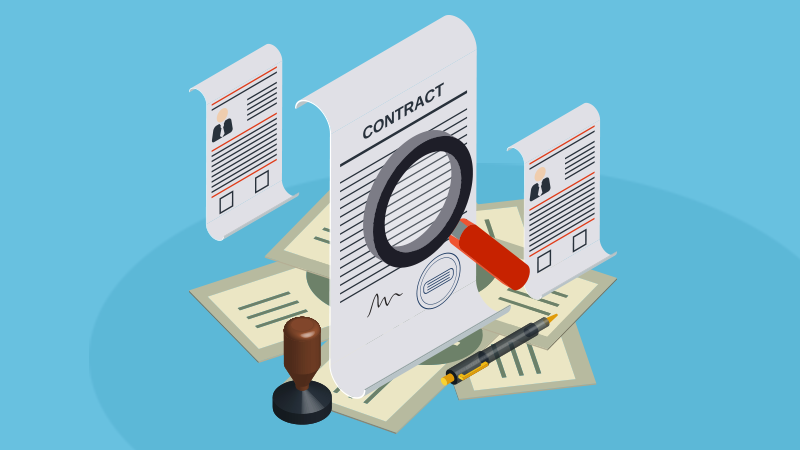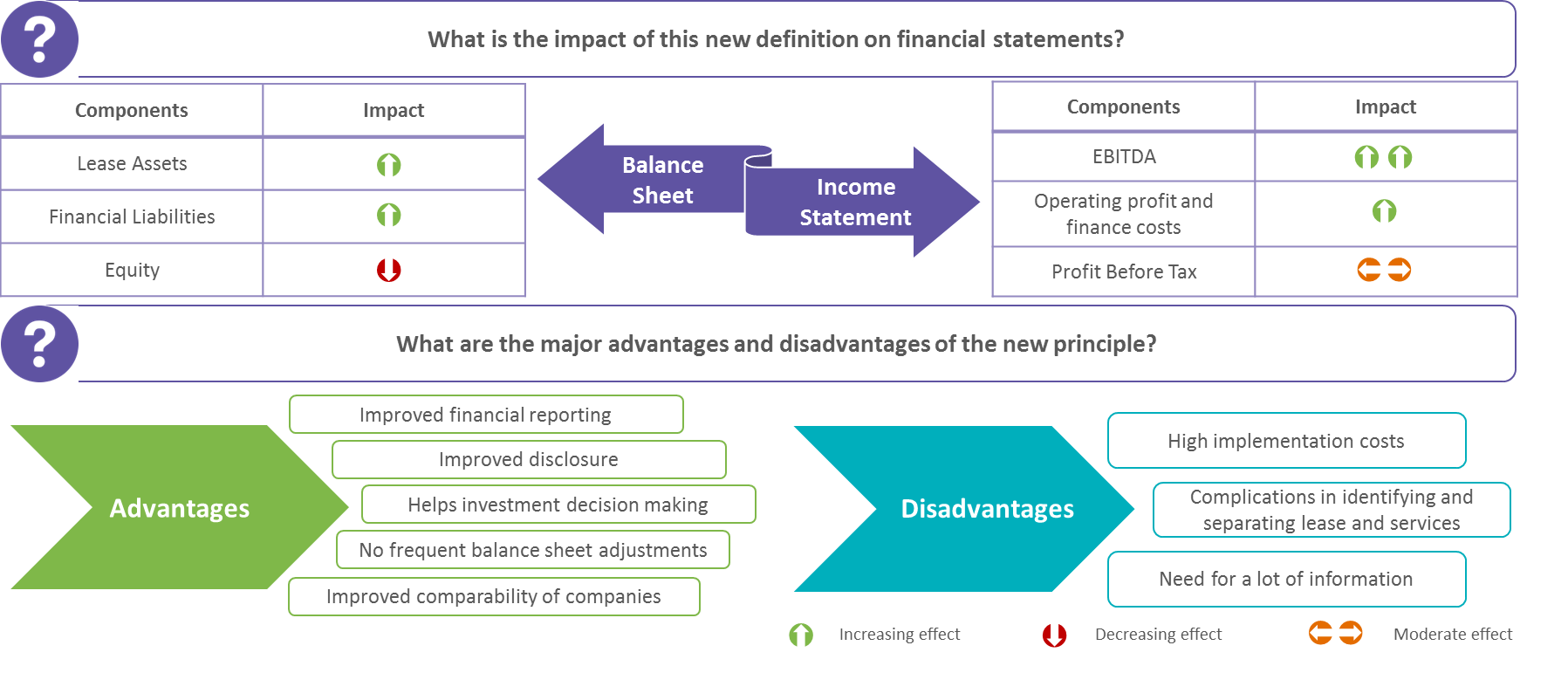
Procurement to play key role under new accounting regime

Sridevi Akkarajuvenkata, Customer Success Lead and Swetha Lepakshi, Lead Analyst

IFRS 16, the new regulation governing leasing arrangements is effective from the period beginning on or after Jan. 1 2019. IFRS 16 Leases introduced by the International Accounting Standards Board (IASB) mandates most leases to be reported on a company’s balance sheet as assets and liabilities, except short-term leases (less than 12 months) or significantly low value leases. The new standard aims to provide much-needed transparency in the lease assets and liabilities of companies by incorporating off-balance sheet lease financing into the balance sheet. Exhibit 1 provides an overview of the key impacts.
Exhibit 1 Key impacts of IFRS 16 Leases

Companies can engage with the following service providers for their IRFS 16 transition. The service provider landscape is characterized by the presence of accounting firms, consulting firms providing financial reporting and advisory services and technology solutions providers.
|
IFRS 16 Compliance Service Providers |
||
|
End-to-End Service Providers (suppliers offering software, implementation, accounting and advisory services)
|
Stand-alone Service Providers (Suppliers offering lease accounting compliance and advisory through partnerships) |
|
|
Accounting Firms |
Consulting/Advisory Firms |
Technology Solution Providers |
|
|
|
Compliance Activities Performed by Suppliers
|
Implementation Stage |
Key Activities |
|
Analyze |
|
|
Configure |
|
|
Test |
|
|
Migration |
|
|
Implementation |
|
IFRS 16 Compliance: Role of Technology Solutions
In the following sections, we will explore how the Procurement function and technology can act as key enablers for successful IFRS 16 transition and compliance.
How can the Procurement Function Help Develop the Lease Inventory?
The first step is to identify and prepare an inventory of all leases. Companies are expected to identify all leases, categorize contracts, extract lease data and develop a centralized database. This is usually a cumbersome process, which means it takes more than one department (finance) to get the first step right. As per our observation, the Procurement Organization could potentially play a vital role in determining and gathering lease related data. With thousands of contracts and lease agreements, the first milestone is to have a repository of all leases and payment-related information in an easily searchable format.
‘Procurement function in any multi-billion dollar company sits on huge pile of lease related data. With just 6 months remaining, companies have to look beyond finance department in order to have a successful transition to IFRS 16’.
There arises a need to implement software/new technology to address this gap. Contracts can reside in various systems and servers spread across the company. Most often, contract information resides in systems such as contract management system (CMS), contract lifecycle management (CLM), ERP, SharePoint, spreadsheets, etc4.
Companies with high volumes of routinized contracts tend to use contracting software with analytics capabilities6. However, if firms use legacy systems and in the absence of an organized database, plug and play contract analytics software should be the go-to option.
If existing systems lack automation capabilities and generate actionable lease-related insights, companies can consider a contract analytics platform.
The thumb rule is that the data should be contained in a single searchable location. Instead of manually analyzing documents, technology can automate this task and save a lot of time. A software tool can easily sift through large volumes of files and provide the necessary analytics to develop a lease portfolio.
The Procurement function can take ownership of implementing the plug and play software available in the market and work along with Finance, Tax, Audit and internal IT departments. Much like how Spend Analytics software works, with the help of APIs, the software can extract data from different internal systems to help develop a centralized database. With one click, users can extract lease clauses and compile a report.
Tools for Improving IFRS 16 Compliance
We recognize that data is present in both structured and unstructured formats and leases are no exception. Hence, it is important to select a software tool with capabilities to sift through large volumes of unstructured data and identify patterns, trends, and anomalies. This also presents an opportunity to review the structuring of leases, contract terms and payments and asses lease liability.
There are software solutions available in the market, which are powered by Artificial Intelligence (AI) and leverage natural language processing techniques. Beroe has identified an indicative list of solution providers. Listed below are some of the major providers of contract analytics software solutions.
|
Company |
Solution |
Solution Overview |
|
ABBYY |
ABBYY Text Analytics for Contracts |
The tool’s powerful micro-service architecture integrates ABBYY’s powerful recognition, data capture and natural language processing capabilities, as well as those available from third parties, to identify and assess sections, clauses and facts from contracts, leases and cognate-sectioned documents. |
|
Beagle Inc. |
Contract Analysis |
The solution offers automatic contract analysis that learns, provides a graphical summary and enables real-time collaboration. |
|
Counselytics |
Contract Analytics |
The tool can unlock the power of unstructured data and turn it into actionable insight. |
|
eBrevia |
Bespoke Contract Analytics Solution |
eBrevia extracts data and complex concepts from documents regardless of the nature of words or their location in a given document. It exports data to a number of internal platforms. The software learns from examples without having to program clauses or key words. |
|
Ernst & Young
|
EY Lease Reviewer |
EY Lease Reviewer (launched proof of concept in October 2017) acts as a smart assistant, helping companies identify and extract information, such as the lease commencement date, payment amounts, renewal and termination options that are required for transitioning to the IFRS 16 standard. It uses AI to convert unstructured lease contracts into structured data. |
|
iManage |
iManage/RAVN |
The revolutionary engine can classify, find, extract and predict information from large volumes of unstructured data sets and documents. |
|
Kira Inc. |
Kira contract analysis platform |
Kira is easy-to-use software that helps companies in uncovering relevant information from contracts and related documents. The solution makes AI accessible to everyone, through an intuitive user interface, including real-time collaboration and project management. |
|
KPMG |
Contract Abstraction Tool |
In cooperation with IBM, KPMG has developed a solution for contract data extraction based on IBM Watson. The tool has cognitive capabilities, and hence, most tasks related to lease data extraction can be easily automated. |
|
Legal Robot |
Beta-Contract Analytics |
The tool automatically extracts key business terms, identifies problems with legal styles, definitions, risky language, etc. It allows users to compare documents and securely collaborate with legal teams. |
|
LegalSifter, Inc. |
LegalSifter, ContractSifter Service, ContractSifter |
Intelligent software that sifts through contracts, extracts terms, identifies missing clauses, reviews contracts, helps in lease abstraction, exports data and creates reports. |
|
Seal Software |
Contract Discovery & Analytics |
Seal can find all lease contracts across the organization, locate and extract all relevant data needed for reporting. Along with its partners, Seal provides program design, extraction policies and playbooks, assesses the impact of IFRS 16 and helps with IFRS transition and compliance. |
|
Sigma Conso |
Sigma Conso Solution IFRS 16 |
The tool helps companies manage lease contracts and intuitively perform all required tasks, collect data from all transaction systems, automate financial calculations, prepare consolidation entries, manage contract documentation and create graphical representations to help teams visualize, implement arbitrage and manage financing. |
Source: Supplier Websites
The plug and play software tool providers also partner with accounting and advisory firms, and contracting software providers. These partners offer end-to-end consulting and implementation services. For instance, in May 2018, PwC announced a joint business relationship with eBrevia. With this, PwC intends to apply machine learning techniques to enable quick and accurate abstraction of key lease terms from unstructured data. Similarly, at the heart of KPMG’s Contract Abstraction Tool is the IBM Watson AI engine. With this collaboration, KPMG intends to help customers with IFRS 16 implementation12.
Key Capabilities of the Software
In layman terms, data needs to be abstracted from a diverse set of contract documents and organized in a readily available fashion. Let us briefly examine the key capabilities of software available in the market.
Find Documents: Locate all contract related documents spread across the organization. Using integration and APIs, the tool can scan and pull relevant files.
Convert Data: The tool will process image files (through OCR) and PDF files and convert them into a user-friendly format.
Data Extraction: With the help of a search engine, the tool extracts relevant contract and lease terms. Each tool comes equipped with an engine governed by AI/ machine learning principles, which applies logic and extracts relevant data/meta data. The tool usually does not rely on keywords; instead, it is trained to use ‘machine learning’ techniques to recognize a concept and abstract relevant data, regardless of the language or format.
Insights: Allows the user to tabulate data, develop dashboards and generate insights, spot trends, patterns and anomalies.
Create reports: Allows users to create and export charts and summaries and share relevant findings with colleagues.
Security Measure: The tool has security capabilities that help companies manage users, define extraction policies, templates and necessary permissions.
Easy Integration: The solution can be easily integrated with internal systems such as contract management system (CMS), contract lifecycle management (CLM), ERP, accounting management tool and other intranet systems.
Any AI-based system goes through a series of fine tuning efforts—the tool is ‘trained’ over time to perform better analytics. While shortlisting potential vendors, we recommend that companies partner with tool providers that have spent significant time extracting and analyzing huge volumes of contracts. An established tool provider, which has spent several years analyzing millions of documents, will have the necessary expertise to deal with the complexity of IFRS 16 transition, compared to new entrants. While the short-term goal is compliance with new lease accounting standards, it is equally important to ensure that the software and policies put in place will continue to be a valuable mechanism for the business.
Related Insights:
View All
Get more stories like this
Subscirbe for more news,updates and insights from Beroe






